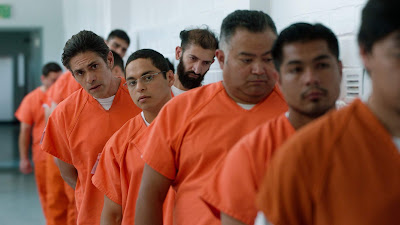The following post is written by our
monthly correspondent, Lee Liberman
This heart-full Italian series, co-produced by
HBO, is so absorbing that the woes of present-day pandemic drift imperceptibly down the grimy byways of poor suburban mid-century Italy on breath of air. Based on much-loved and admired novels by pseudonymous writer,
Elena Ferrante, the story explores the challenging, adoring, quietly violent bond between two girls, Lila and Elena (Lenu), whose lives are yoked to a neighborhood of drab low-rises outside Naples. Series one begins in childhood and lasts through adolescence; their young adult relationship unfolds in the second, episodes dropping Monday evenings, now more than half concluded.
In the opener we glimpse storyteller Lenu, age 60, tapping out the story on an Apple computer. Tinged with bitterness, her tale paints pictures of dominance, machismo, submission, self-abnegation that will unfold in four series — one per novel.
The set (left) is described as one of the largest in Europe, an entire neighborhood recreated including apartments, shops, dusty streets and island vistas (Ischia, below) described in the novels.
The sets and locales are magnets for tourists, creating a boom not unlike what ‘Outlander’ inspired in Scotland. The difference is that “My Brilliant Friend” is true literary and film beauty; ‘Outlander’, despite its Jacobite history attracting genuine interest in Scotland’s clan past and wars with the English, does not climb out of the paperback fantasy/romance genre.
‘Brilliant’s’ director, 43 year old
Saverio Costanzo, manages to burn into your mind the waste inherent in post-WWll poverty, emotional and physical violence nurtured in a small neighborhood governed by petty extortion and the secrets everyone knows. (Below, Costanzo, center left, above young Elena, “Lenu” with her parents, far l, siblings, and crew members.)
Costanzo is quoted in the Guardian: “It’s a story that somehow belongs to everyone. I found myself…in Elena’s and Lila’s shoes. It’s like a mirror...a kind of miracle that happens very rarely…..”. Michelle Obama is an admirer; Hillary Clinton is quoted: “...hypnotic... I could not stop reading or stop thinking about it.”
Both girls are brilliant —differently. Lila is an instinctive philosopher and didact; she sponges up everything there is to know on all subjects, a strangely exceptional child for whom the very young actress,
Ludovica Nasti, is a perfect fit. (Nasti, is like a giant...a genius… says Costanzo.) Lenu, played in childhood by
Elisa del Genio, is smart but must work to achieve. When she does, she is number one, but her winning is the product of dogged effort not genius. In their poor household, Lenu’s mother, grudgingly, cruelly, goes along with her advancing in school at the urging of an empathic teacher (
Dora Romano, below).
Lila’s father, the gnarly owner of a shoe repair shop, dismisses education beyond elementary school for his daughter; her defiance and his brutality are the outcomes. It is the dis-affirmation of her sharp little mind, her right to succeed using her intelligence, that undergirds Lila’s perpetual spite and later self-destructive life-choices. Later you hear her father’s cruelty in Lila’s young adult voice as she forewarns Lenu:
Don’t listen — the witch inside me is talking. Lenu has been positioned as the submissive, like Lila’s brow-beaten mother.
It is hard to convey how engrossing the story of these two little girls becomes. You float through childhood with them, pushing boundaries, daring, competing, yet supporting each other, recalling your own neighborhood confrontations, games and escapes as you share in theirs, likely more violent than your own.
Then come the bully-cum-mobsters, the flirtations, the books, the rain deluges, the parental shoutings, the ignored violence (even killings) the street peddler’s calls, streets fogged with dust. They sit on a bench reading and reciting ‘Little Women’ to each other, the pages of their shared copy increasingly tattered. The genteel poverty of Alcott’s ‘Little Women’ was lovely beauty to these waifs in their homely world; Jo, the writer, is their goddess.
By the third episode, rightly called ‘the Metamorphoses’, the girls are adolescent, and Lenu (
Margherita Mazzucco) is mortified by the blood between her legs — is she dying? The sharply-dressed Solara brothers (they look like light is ‘shining down on them’) flatter and cajole a shy girl into their new car. ‘Those guys don’t just kiss, they bite like mad dogs’, says Lila (
Gaia Girace). Sure enough, the shy girl is dropped off bruised, devoured.
Lenu discovers the power her body has over boys, even with her acne-spotted face, and secretly savors Lila’s defiance. Suddenly the fights in the street aren’t the noise of adults swirling overhead, but involve themselves.
The girls’ relationship waxes and wanes. Lila resents Lenu’s being in school; she proves her superiority by teaching herself Latin and Greek in secret. At other times, Lila teaches Lenu how to analyze text, prodding her to improve, living through Lenu’s success. To Lenu, her life is flat without the dynamite of Lila.
Lila’s defiant marriage to the thuggish Stefano (
Giovanni Amura, below) steps her up from poverty into comparative luxury and offers a new target for her anger. She provokes his repeated beatings (boasting they make her stronger) and more drama is injected into the girls’ friendship.
Lila buys Lenu her high school books — her mother weeps with gratitude — our first shred of sympathy for the desperately angry woman. Then, in the chapter called ‘Erasure’, Lila turns on her friend, mocking her cruelly, transferring her rage on to Lenu who is climbing out of the neighborhood milieu into a more socially-conscious one.
As the girls mature, Lila continues to sharpen her claws on Lenu, and we imagine their adult friendship uneasily. (Ferrante describes the feral Lila as acting with “a hiss, a dart, a lethal bite.”) Lenu pines for Nino,
Francesco Serpico, (below); the married Lila gets between them.
Still we watch, our own youth and dashed dreams immersed in theirs as Lenu’s passivity and Lila’s betrayals mount up. The story-telling is so dreamily fine, the atmosphere so reminiscent of one’s own despite all its differences in time and place, it will transport you there from the view of deserted streets out your windows.
View the series trailer
here.
Note: If you would like to see more about epidemics, superstition, masks, and handwashing, check out the following:
Downton Abbey, Season 2, episode 6 for the 1918 Spanish flu (PBS, passport; Amazon Prime).
Outlander, Season 3, episode 10 for a shipboard typhoid outbreak in the 1700’s (Starz, Netflix).
The Physician, lovely film with Ben Kingsley and Stellan Skarsgård, for a battle with the black death in 11th century Persia (Netflix).
Ken Follett’s World Without End episode 106 for arrival of the black death in 1341, in which ancient Persian texts are used to guide the treatment of the plague (Starz).

























































